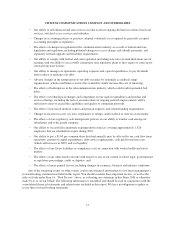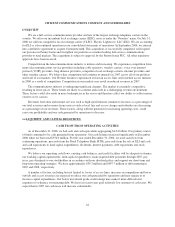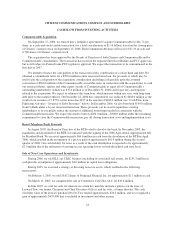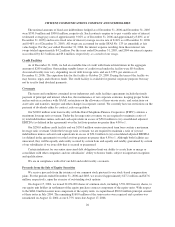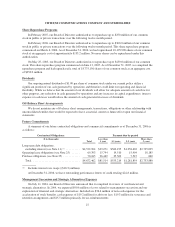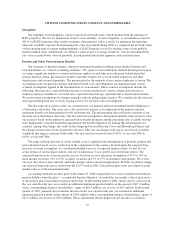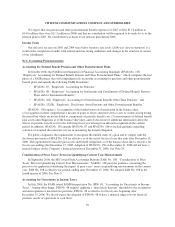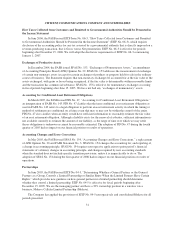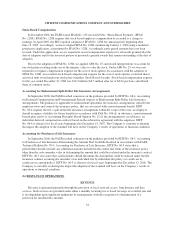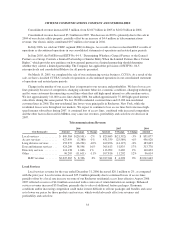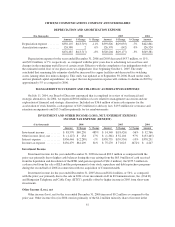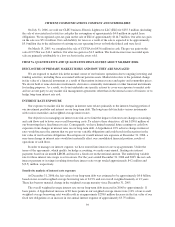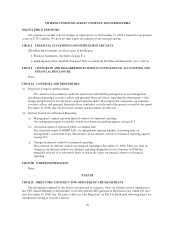Frontier Communications 2006 Annual Report Download - page 32
Download and view the complete annual report
Please find page 32 of the 2006 Frontier Communications annual report below. You can navigate through the pages in the report by either clicking on the pages listed below, or by using the keyword search tool below to find specific information within the annual report.CITIZENS COMMUNICATIONS COMPANY AND SUBSIDIARIES
How Taxes Collected from Customers and Remitted to Governmental Authorities Should be Presented in
the Income Statement
In June 2006, the FASB issued EITF Issue No. 06-3, “How Taxes Collected from Customers and Remitted
to Governmental Authorities Should be Presented in the Income Statement” (EITF No. 06-3), which requires
disclosure of the accounting policy for any tax assessed by a governmental authority that is directly imposed on a
revenue-producing transaction, that is Gross versus Net presentation. EITF No. 06-3 is effective for periods
beginning after December 15, 2006. We will adopt the disclosure requirements of EITF No. 06-3 commencing
January 1, 2007.
Exchanges of Productive Assets
In December 2004, the FASB issued SFAS No. 153, “Exchanges of Nonmonetary Assets,” an amendment
of Accounting Principles Board (APB) Opinion No. 29. SFAS No. 153 addresses the measurement of exchanges
of certain non-monetary assets (except for certain exchanges of products or property held for sale in the ordinary
course of business). The Statement requires that non-monetary exchanges be accounted for at the fair value of the
assets exchanged, with gains or losses being recognized, if the fair value is determinable within reasonable limits
and the transaction has commercial substance. SFAS No. 153 is effective for nonmonetary exchanges occurring
in fiscal periods beginning after June 15, 2005. We have not had any “exchanges of nonmonetary” assets.
Accounting for Conditional Asset Retirement Obligations
In March 2005, the FASB issued FIN No. 47, “Accounting for Conditional Asset Retirement Obligations,”
an interpretation of FASB No. 143. FIN No. 47 clarifies that the term conditional asset retirement obligation as
used in FASB No. 143 refers to a legal obligation to perform an asset retirement activity in which the timing or
method of settlement are conditional on a future event that may or may not be within the control of the entity.
FIN No. 47 also clarifies when an entity would have sufficient information to reasonably estimate the fair value
of an asset retirement obligation. Although a liability exists for the removal of asbestos, sufficient information is
not available currently to estimate the amount of our liability, as the range of time over which we may settle
theses obligations is unknown or cannot be reasonably estimated. The adoption of FIN No. 47 during the fourth
quarter of 2005 had no impact on our financial position or results of operations.
Accounting Changes and Error Corrections
In May 2005, the FASB issued SFAS No. 154, “Accounting Changes and Error Corrections,” a replacement
of APB Opinion No. 20 and FASB Statement No. 3. SFAS No. 154 changes the accounting for, and reporting of,
a change in accounting principle. SFAS No. 154 requires retrospective application to prior period’s financial
statements of voluntary changes in accounting principle, and changes required by new accounting standards
when the standard does not include specific transition provisions, unless it is impracticable to do so. The
adoption of SFAS No. 154 during the first quarter of 2006 had no impact on our financial position or results of
operations.
Partnerships
In June 2005, the FASB issued EITF No. 04-5, “Determining Whether a General Partner, or the General
Partners as a Group, Controls a Limited Partnership or Similar Entity When the Limited Partners Have Certain
Rights,” which provides new guidance on how general partners in a limited partnership should determine
whether they control a limited partnership. EITF No. 04-5 is effective for fiscal periods beginning after
December 15, 2005. We are the managing partner and have a 33% ownership position in a wireless voice
business, Mohave Cellular Limited Partnership (Mohave).
The Company has applied the provisions of EITF No. 04-5 retrospectively and consolidated Mohave for all
periods presented.
31


